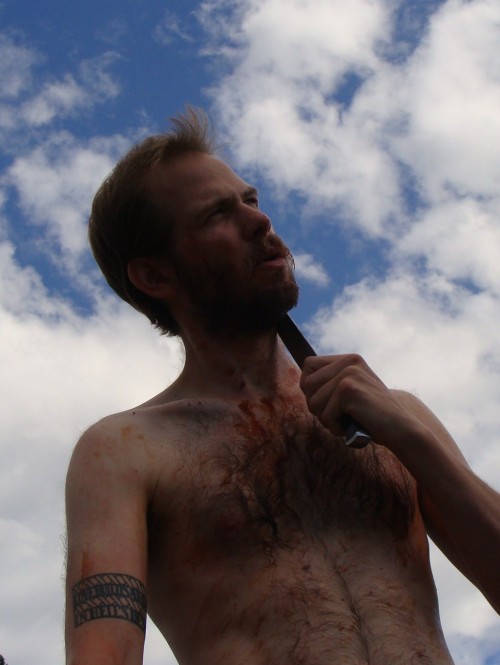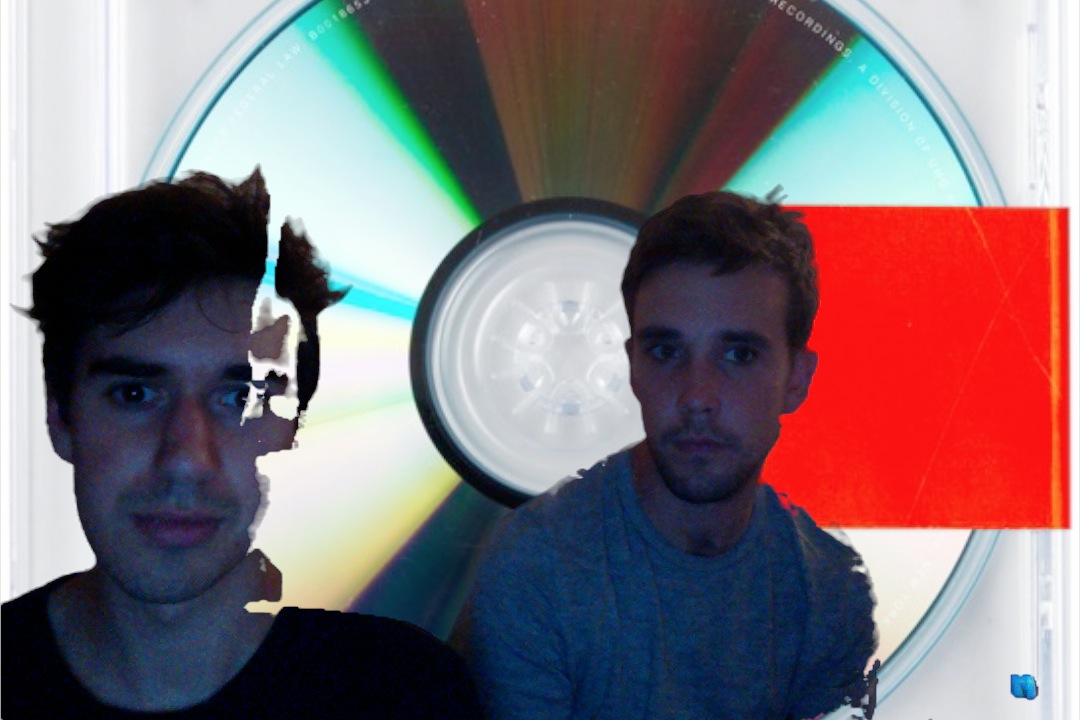Joe Hall’s Poetry Road
****
Joe Hall is currently about two-thirds done with a 35 day reading tour in support of his new book, The Devotional Poems, and while staying with me here on his Seattle stop, Joe and I did a little interview and photo shoot. (The rule, fyi, for the interview was that Joe could only answer with phrases and lines from his new book.)
******************************************************************************************************************
Besides Willie Nelson’s “On the Road Again” & Bob Seger’s “Turn the Page” what sort of music and sound things have you been listening to on the ol’ lonesome Poetry Road?
In the motherfucking sounds and motherfucking light
All the horns that do not blow
A stethoscope and a quarter ounce
Getting loose, kind of stupid
******************************************************************************************************************
Away from Cheryl (yr monogamous partner of over 7 years , whose absence you named your DC Reading for:“Cheryl’s Gone”), how do you deal with physical loneliness and arousal of the Poetry Road (all the Sirens, deserts, Mermaids, thorn-stimulants, wenches, etc, etc, yawn,…)???
I wake up and my balls are dragging behind me
Like wet paper bags of trash
So I murder that huge ball of pink grasping
Hands
With one shrinking word
Waiting on tender feet
Blotched faces to the flames
I never meant to go, to flee, to leave you READ MORE >
Joe Wenderoth & Colin Winnette Talk WCW’s Spring And All
For this series I’m asking the writers I love to recommend a book. If I haven’t read it, I read it. Then we talk about it.
For this installment, Joe Wenderoth recommended Spring and All by William Carlos Williams.
Joe Wenderoth grew up near Baltimore. He is the author of No Real Light (Wave Books, 2007), The Holy Spirit of Life: Essays Written for John Ashcroft’s Secret Self (Verse Press, 2005) and Letters to Wendy’s (Verse Press, 2000). Wesleyan University Press published his first two books of poems: Disfortune (1995) and It Is If I Speak (2000). He is AssociateProfessor of English at the University of California, Davis.
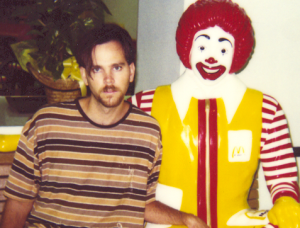
Colin: First off, I’m interested in why we read what we read. Can you talk a little about what brought you to the book? What were the conditions that led to your picking it up for the first time, and why did you want to talk about it here with me?
Joe: I’ve been a full Professor for about 3 years now—I guess they don’t change the bio on the UCD website. why bother with correcting this? well, to become full prof you have to fill out a bunch of forms, and I would hate to think that it was all for nothing. I was doing a reading at the new school in ny and Robert Polito introduced me, saying that Letters to Wendy’s was a uniquely indescribable book, akin to Spring and All (at least in that respect). anyhow, as I had not read it, I figured I should. it took me quite a while to figure it out, but the process was always rewarding so I kept on with it and ultimately found it to be one of the best books in american english. it is a remarkably prescient book—seems like it could have been written yesterday. it seems especially remarkable in that it was written in response to “The Waste Land” (and Eliot’s much celebrated poetics), and in that its implicit criticisms of Eliot’s poetics was so far ahead of its time. it is hard for me to believe that Eliot was taken as seriously as he was. now, only undergrads are fooled, but back then, Williams was quite in the minority, and totally obscure as a poet and thinker.
Colin: Walk me through your experience of this book. It takes so many forms simultaneously: criticism, manifesto, a book of poems, a single poem, self-analysis, polemic, just to name a few. Do you have more than one approach to reading it? Do you/have you studied it in any kind of rigorous or structured way, or do you read it simply for what sticks?
Joe: I have read every word closely. I’ve taught a class on it—a class reading just this book. and I’ve taught it in other courses, too, in l briefer focus. it took me awhile to see how it all fits. I don’t see it as a single poem. I see it as a manifesto, with poems interrupting every now and then to demonstrate his thinking.
Colin: Could you bullet point a few of these “implicit criticism”s you mentioned before? Not as a defense of the statement, but rather as a potential guide/reference readers picking upSpring and All for the very first time? It’s largely an experiential text, though Williams is fairly direct when positioning himself relative to his potential critics and other approaches to poetics, but I’d love to hear your particular articulation of these criticisms, stated as simply as possible.
Joe: In a letter to James Laughlin, Williams wrote: “I’m glad you like his verse; but I’m warning you, the only reason it doesn’t smell is that it’s synthetic. Maybe I’m wrong, but I distrust that bastard more than any other writer I know in the world today. He can write, granted, but it’s like walking into a church to me.” In a letter to Pound, he referred to Eliot’s work as “vaginal stoppage” and “gleet.” In many ways, the church Williams refers to might be taken as a symbolic manifestation of the shelter of so-called Western tradition. Eliot left the church… or rather, the church fell down. And what did he find outside of its ruins? A Waste Land. A place where our alleged intelligence—especially concerning our conception of ourselves—has failed utterly. A place of cruel stupidity (which he mocks), impotence (which he grieves), and despair (which he attempts, albeit somewhat half-heartedly). Well, Eliot then went back into the church, however gloomily. Its ruins was enough, apparently.
In any case, Williams and Eliot are in agreement about the failure of the church, which is to say, the failure of our conception of ourselves. Darwin, Marx, Nietzsche, Einstein, Freud, etc…. The progress of Science, both poets agree, has obviously caused a great disruption, emptying out our previous conceptions. What they disagree about is the significance of this disruption—its impact on human consciousness. When Williams experienced the church falling down around him, he was heartened. He saw his departure from the hushed space of tradition as a great liberation, and the collapse of the church as a stroke of luck. An escape from a gloomy place. The failure of past intelligence (traditional understanding) is something he acknowledges—but it does not cause him distress… because he feels The Imagination is still in working order, and still functions—perhaps functions even more powerfully as it becomes more capable of shedding false intelligence. READ MORE >
Crying Woolf
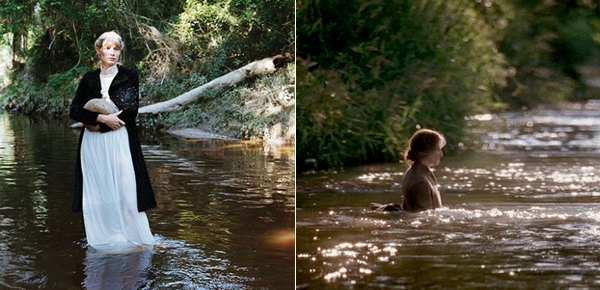
On October 26, 1984, nineteen-year-old John McCollum committed suicide by shooting himself in the head while listening to “Suicide Solution” by Ozzy Osbourne. The former’s parents would later file a lawsuit against the latter, claiming there were “hidden lyrics” telling listeners to shoot themselves. At two minutes into it, between verses, Ozzy does sort of mumble away from the mic what sounds like “soot, soot…haha,” which wife/witness Sharon attributed to her husband’s “minimal” command of the English language. The opening lines wine is fine but whiskey’s quicker / suicide is slow with liquor seem to borrow both cadence and conceit from Dorothy Parker’s “Resumé¹,” in which she offers life as a disappointing alternative to rather uncomfortable death options. Likewise, Ozzy’s lyrics also end in an anti-suicide predictably pro-inebriation stance: take a bottle, drown your sorrows / then it floods away tomorrows. The court dismissed the McCollum lawsuit, ruling that their son’s suicide was just that. His parents wanted someone to blame, because they couldn’t bear blaming themselves. God is the one scapegoat who never talks back, so in the end we all hold him liable, and finally quiet down.
25 Points: Family System
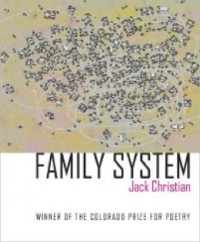 Family System
Family System
by Jack Christian
Center for Literary Publishing, 2012
57 pages / $16.95 buy from Amazon
1. On the inside of most of my books, I often write down the date and place I acquired the book or where I was when I started reading it or who gave it to me or what state of mind I was in at the time. Some kind of carving goes into the tree. Maybe it’s indulgent, this insisting on making my DNA / my curry stains present and part of. It makes me think of K holding the door open for me and saying, “I’m not sure nostalgia is as bad as we think it is.” This book, Jack Christian’s Family System, has two pieces of handwriting in it. It says, on the very first possible page, “Boston, MA, 2013. Given to you. You were drunk.” On the next page is Jack’s signature.
2. A text message received while I was at a goodbye party: “Everything becomes important so quickly. Being around my parents has made me feel so young again.”
3. While I was in the basement of the Cantab Lounge in Boston, I fluctuated myself to younger and in the middle of a few years ago. I was in Asia reading this line from Christian’s poem, “Northampton Ectastic,” for the first time somehow (?) on Gregory Lawless’ blog in an apartment that leaked karaoke at me from all directions late at night. “The chickens I’m to meet in weather unapproachable.” I read this line and crawled out the window with some some raisins shoved in my mouth. I handed my body dumb to the nearest Kimchi pot about to go underground.
4. “My agitated arms grow knotted.
The term to describe this is inextricable.”
-New Revised Standard
The third years in my MFA program recently finished their thesis defenses / presentations. A lot of them wrote about their families. Inevitably, not all of it was / is happy. At every defense, there was some innocuous chatter about whether or not family had attended, whether or not we would have asked our family to come if the thesis being presented was our thesis, if we (the first and second years) were going to invite our family to our defenses. What we would say and what we wouldn’t.
5. “We’re in a giant mom and and dad linked by a heart.
We’re going round in circles in the figure eight”
-Family System
We are galaxy on galaxy on galaxy. (“You think they resemble a galaxy spinning, / but to them you think it’s like being inside two plants / joined at the stalk.”-FS) The last minute of Men in Black is RIGHT. The disorientation of this intimacy of blood. Do we ever know if we are further away or getting closer?
Is it clear to us how we are RELATED to our families exactly? Or is it always changing? My friend, A, sees a picture of my mother and says I look just like her. I reply, “Really?” in a voice that people often mistake for my mother’s on the phone.
“This is the myth of retrospective cohesion.”
-Eight Monks in Unison.
6. “None were flyover people,
nor were they reincarnations, nor stories with beginnings, muddles
and James, who was strangely present, Emma or not,
accepted in that time and place. Vanessa.”
(Marie)
When I turned the book over to see who blurbed, I saw Tomaz Salamun and nodded. I’ve been reading On the Tracks of Wild Game (a wine, a whirlwind) on and off and again and again for maybe six months. I can’t really bear to bring it back to library. Brandon Shimoda wrote a stunning piece at the Volta about Salamun’s blazing use of names in his books. According to Shimoda, Salamun and Christian (according to me) are doing an interesting thing in that they are showing us the systems (the picture of the subdivision from way high up on the front of Family System) surrounding and filling out not just the person, but the “citizen” living a “free country life.”
7. I initially balked at these terms Shimoda chooses to use to talk about Salamun / a poet documenting LIFE. They make me see uniforms a little too tight. They make me feel a little lifeless (life less). However, they’re the right ones (terms from a different way high up / aerial perspective), not only because their part of our first-world reality here in America (and the forgetting we like to do re: what our country is and does to other countries), but because of the way that allows the naming of names to come alive, to rupture us towards richness in spite of the system, which both depletes those names and makes those names possibly networked. There are people here being things / being beings to each other. These are people going beyond the requirements, which breaks the system. It is breaking the system is continually having / failing to adapt to.
8. A Public is a vehicle by which we are transported.”
-A Cataract
9. Here’s Shimoda:
“One characteristic of Tomaž’s work I find fascinating is the constant naming of people—family members, friends, lovers, acquaintances, heroes, poets, artists, politicians, villains—that seems partly not able to be helped: a both conscious and unconscious uttering of names emerging from a true exuberance for being in relation to PEOPLE. Tomaž intones the names of those who populate his poems’ and books’ unfolding free country-life; his intoning, to my ears, anoints the people as both beloved and legend, and within it I begin to hear a nation, or maybe, the dissolution of all nations in the citizens of a free country-life. But they are more than either situational or ecstatic intonations (as if that alone was deficient); they are recollections of the EARTH and the startled, shimmering CLOCK FACES passing upon it…Tomaž makes people PHENOMENAL.”
10. Christian allows the the I of the book to give us a stream of people, mothers and friends and farmers and writers and cousins and peopleIhavenoideawhotheyare hovering in the planet Virginia, that glow PHENOMENAL on the elastic floors of the poems. Where Christian deviates from Salamun lies within the urgency of the tone deployed by the narrating voice. Salamun’s I, in On the Tracks of Wild Game, gives us a dizzy hula hooping afflicted with hives. The voice of Christian’s I exudes a tone that is steadier and absorbent, though perhaps no more or less reliable. “The city came by for the trash. / I found a science of imaginary solutions, which was a good thing” (Responsibility). It is not a voice indifferent to being caught in an orbit of people and place with a poetic tongue, but it accepts or replicates the rhythms and paces of the persistent oscillation orbits have as a way of engaging with observation that pulls the I closer, than backs it away. The steadiness allows the illogical to leak in, to rub, but not roughly. It becomes part of the system, how it perpetuates, but re-forms it into a system that can be unpredictable. READ MORE >
June 20th, 2013 / 12:00 pm
Seattle Author Spotlight (2) — Maged Zaher
Thanks for all the great feedback on the Author Spotlight I did on Richard Chiem! So many flowers (awwww)! So much chocolate (awwww)! And even a phone call from the president which, sadly, went to voicemail. It’s really all been kind of overwhelming (sigh, swoon). But, here anyways, now, is the 2nd Spotlight– on Maged Zaher!
Maged Zaher is very engaging, warm, likable, and was born in a great year (1967, a year in which Rauan Klassnik and Aase Berg were also born.) Maged is currently up for Seattle’s “Stranger Genius Award” which comes with a $5,000 prize. So, congrats, man, & good luck!
(Brendan Kiley, in The Stranger’s write-up on Maged Zaher, describes our Spotlight Author as a “merry melancholic” and goes on to say that “in Zaher’s work, intimacy is the gold medal, but also something to be feared.”)
It was a real pleasure hanging out with Maged for a couple of hours earlier this week. Maged likes to talk poetry, ideology, politics, sociability, soccer, etc, etc. And he’s totally cool with strong, differing opinions which, well, suited me just fine!
This spotlight, then, is comprised of a brief bio, a short interview and a couple of photos. So, say hello now to Maged Zaher!
READ MORE >
Anna Joy Springer’s SUMMER READS
With the last of the SUMMER READS, the wonderful Anna Joy Springer tells us about her summer reading:
(in case you missed any, check out all the SUMMER READS here)
***
For many literary arts and criticism professors, winter break is the time to read yummy light novels, while summer is time for texts that ask for more interaction. This summer I will read some things that require fuller attention than I can give during the school year, when I’m reading and analyzing student drafts.
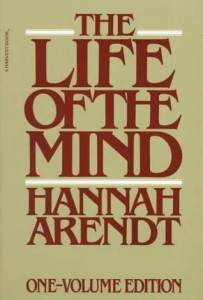 I will read Hannah Arendt’s The Life of The Mind, finally. I’ve read the first two chapters, and I’m so glad to have saved her til now, so I can remember what boldness of inquiry and depth of offering look like.
I will read Hannah Arendt’s The Life of The Mind, finally. I’ve read the first two chapters, and I’m so glad to have saved her til now, so I can remember what boldness of inquiry and depth of offering look like.
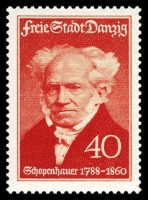 Arthur Schopenhauer’s The Emptiness of Existence: “This cannot possibly be true says The Heart and even the crude mind after giving the matter (not-being for thousands of years, then being alive for a few decades, then not-being for thousands of years again) some consideration.” Because I recognize that sense if spiritual befuddlement and want to know more about possible connections btwn Germam Romanticism and Buddhism (and which Buddhism?)
Arthur Schopenhauer’s The Emptiness of Existence: “This cannot possibly be true says The Heart and even the crude mind after giving the matter (not-being for thousands of years, then being alive for a few decades, then not-being for thousands of years again) some consideration.” Because I recognize that sense if spiritual befuddlement and want to know more about possible connections btwn Germam Romanticism and Buddhism (and which Buddhism?)
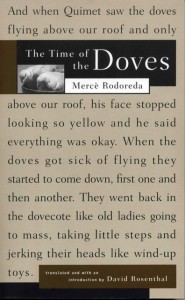 Merce Rodoreda’s The Time of The Doves, translated by David Rosenthal, a Spanish civil war novel by a beloved Catalan lyric prose writer, called “the most beautiful novel published in Spain since the Civil War” by Gabriel Garcia Marquez in early 1980’s and recently given to me by Aaron Cometbus because it illustrates an overlap between our very different literary tastes. (Graywolf Press)
Merce Rodoreda’s The Time of The Doves, translated by David Rosenthal, a Spanish civil war novel by a beloved Catalan lyric prose writer, called “the most beautiful novel published in Spain since the Civil War” by Gabriel Garcia Marquez in early 1980’s and recently given to me by Aaron Cometbus because it illustrates an overlap between our very different literary tastes. (Graywolf Press)
June 19th, 2013 / 11:00 am
Comment on This Post: Giant Triple Threat Giveaway (Ken Baumann, Marie Calloway, Tao Lin)
I know there was a Tao Lin post x hours ago, but I don’t care. I have books to give away. Want to win free books? Want to grumble? Comment on this post to get one of these:
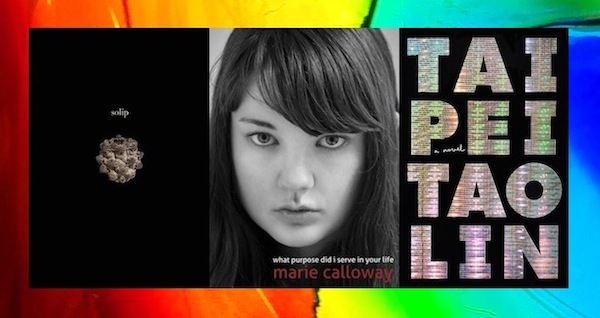
FIRST PRIZE goes to the commenter with the best* comment
SECOND PRIZE goes to the commenter with the worst* comment
THIRD PRIZE goes to the commenter who makes the MOST* comments (bonus for over 100)
each prize will be selected randomly from the (pictured) prize pool of:
Solip by Ken Baumann
what purpose did i serve in your life by Marie Calloway
Taipei by Tao Lin
*as calculated by me
(for the curious, the reason I have these books is that I pre-ordered two out of the three, then received ARCs. i bought two copies of Ken’s because I knew it would be badass)
Kanye West Yeezus Listening Party
Music by Kanye West. Commentary by Lakshmi Singh, Leonard Lopate. Beer by Pabst Brewing Company.
25 Points: The Selected Poems of James Henry
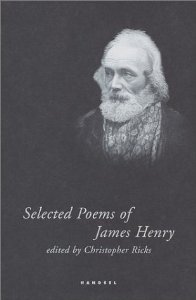 The Selected Poems of James Henry
The Selected Poems of James Henry
by James Henry
Handsel Books, 2002
180 pages / $22.00 buy from Amazon
1. There really is no direct route to Irish poet James Henry (1798- 1876).
2. Most often his fans come by way of Henry James (an absent comma in a library computer) and a well-developed sense of humor.
3. Despite a consistent output (six strong books of poems, beginning in the 1850’s), James Henry was a virtual unknown until the poet Christopher Ricks included him in the 1987 New Oxford Book of Victorian Verse.
4. According to Ricks, the books he found in the Cambridge Library had never been cut. Ricks discovered an enormous treasure in Henry’s work.
5. James Henry shows a hilarious and distinctly modern vision of the world.
6. He champions the prosaic.
7. In one poem he declares, “Blessed be the man who first invented chairs!/ And doubly blessed, the man who beds invented!”
8. In another he celebrates the pleasure of the mattress, “Let those, who will, enjoy the English bed/Of feather-stalks from which successive housemaids/Have pillaged to the last flock of the fine down/…Give me the Italian mattress broad and long/ Of fine, combed wool elastic; and the coarse/Hempen or linen sheets, washed in the fountain.”
9. On his favorite blossoms, “Sweet breathes the hawthorn in the early spring/ And wallflowers petals precious fragrance fling,/Sweet in July blows full the cabbage rose/ And in rich beds the gay carnation glows…But of all odorous sweets I crown thee queen/ Plain, rustic, unpretending, black eyed bean.”
10. Henry was a practicing physician and a student of Virgil. Following his retirement, he traveled Europe, settling in Dresden. This modern cosmopolitanism and his career in medicine both shine through in his strongest works. READ MORE >
June 18th, 2013 / 2:32 pm
Grant Maierhofer’s SUMMER READS
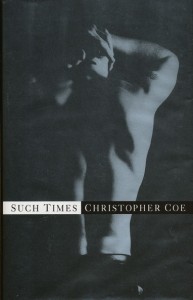 Such Times by Christopher Coe
Such Times by Christopher Coe
I read Coe’s I Look Divine earlier this year after reading about his connection to the Lish workshops and deciding he seemed like my kind of writer. With his first book, I was absolutely correct; it’s a spare portrait of two brothers via one’s memory, and the prose is some of the tightest and most touching I’d read in months. Such Times is Coe’s last book, and its primary concern is the AIDS epidemic and its effect on the lives of three young gay men. It’s a tragedy because Coe himself died of AIDS in the 90s, and I have no idea why this book is so attractive to me at the onset of summer. (…)
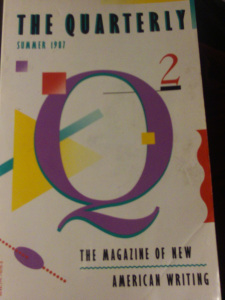 #2 of The Quarterly
#2 of The Quarterly
Again, because of Lish, I started buying up old issues of The Quarterly on the internet from time to time and have been making my way through them. There’s no preamble in these, no discussion of authorial intent, just a nice slim edition from Vintage that immediately thrusts you into the most powerful short storytelling voices in the late 80s. I recognize hardly any names in this one, which will probably mean they’ll all meld together even more so than the last, but I don’t care. The stylistic efforts being made between these pages are fucking huge.
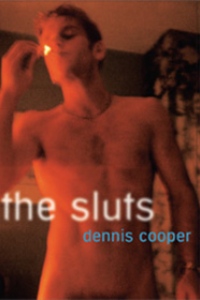 The Sluts by Dennis Cooper
The Sluts by Dennis Cooper
This year was sort of fucked in the face by an extremely fast reading of Cooper’s George Miles Cycle—I intended to write something about it and continue to fail immensely—followed by an equally quick reading of the first Grove Press paperback edition of Sade—the major face-fucking then being done by Philosophy in the Bedroom. I’ve been a fan of Cooper’s for quite some time now, and have read most of his books except for this one. I saw a list somewhere of books that sort of warped Ariana Reines’ perspective, and this was on it, so I’m real excited.
June 18th, 2013 / 11:00 am

